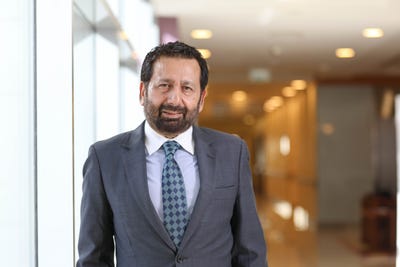Cultural and strategic alignment essential for AI-enabled hospitals
Pairing compassion with intelligent care key to implementing AI in healthcare systems.
October 29, 2025

In the evolving landscape of healthcare, the AI-enabled hospital is no longer a distant aspiration — it is an emerging reality. As we stand at the intersection of clinical excellence and digital innovation, artificial intelligence offers a profound opportunity to reimagine how hospitals operate, how care is delivered, and how outcomes are measured. For healthcare systems across the Middle East, this transformation is not just about technology — it is about leadership, vision, and the courage to redesign care around human needs.
From reactive to predictive: a new clinical paradigm
Traditionally, hospitals have operated in reactive mode — responding to illness, managing crises, and navigating resource constraints. AI shifts this paradigm by enabling predictive, personalised, and proactive care. Machine learning algorithms can now analyse vast datasets — from radiology scans to genomic profiles — to detect patterns invisible to the human eye. This translates into earlier diagnoses, more accurate treatment plans, and reduced clinical errors.
For example, AI-powered decision support tools can flag high-risk patients in emergency departments, enabling timely interventions. In oncology, algorithms trained on thousands of pathology slides can assist clinicians in identifying tumour subtypes with remarkable precision. These are not theoretical use cases — they are already being piloted across leading institutions in the UAE.
Optimising patient flow and experience
One of the most tangible benefits of AI lies in streamlining patient journeys. Hospitals are complex ecosystems where delays in one department ripple across the entire system. AI can optimise scheduling, bed allocation, and discharge planning by continuously learning from operational data. Predictive analytics can forecast patient volumes, helping administrators prepare for surges and allocate staff accordingly.
Moreover, natural language processing (NLP) tools can enhance patient engagement by powering chatbots and virtual assistants that answer queries, schedule appointments, and provide post-discharge instructions. These technologies not only reduce administrative burden but also empower patients with timely, personalised information — an essential ingredient in building trust and improving satisfaction.
Resource management and predictive maintenance
Beyond clinical care, AI is revolutionising how hospitals manage their infrastructure. Predictive maintenance algorithms can monitor equipment performance in real time, flagging potential failures before they occur. This minimises downtime, reduces costs, and ensures continuity of care.
Inventory management is another area ripe for transformation. AI can track usage patterns of medical supplies, anticipate demand, and automate procurement. This is particularly valuable in multi-site hospital networks, where centralised visibility and coordination are critical. This is essential for scalability.
Embedding AI as a strategic imperative
Integrating AI into hospital operations requires more than technical deployment — it demands cultural and strategic alignment. Leadership must champion a vision where technology augments — not replaces — human expertise. Clinicians need to be involved from the outset, co-designing solutions that fit their workflows and respect clinical judgment.
Data governance is equally vital. Hospitals must ensure that AI systems are trained on ethically sourced, representative data, and that outputs are transparent and explainable. Regulatory frameworks such as NABIDH and Malaffi provide a strong foundation for secure data exchange, but hospitals must go further — embedding privacy, equity, and accountability into every algorithm.
The role of visionary leadership
As someone who has led healthcare transformation across the Middle East, I believe the AI-enabled hospital is not just a technical milestone — it is a leadership challenge. It calls for bold decisions, cross-sector collaboration, and a relentless focus on outcomes. Board members, regulators, and hospital executives must work together to define metrics that matter: reduced readmissions, improved clinician satisfaction, enhanced patient safety. These outcomes must guide every AI initiative, ensuring that technology serves the mission — not the other way around.
Ambitions for a human-centred future
Ultimately, the promise of AI lies in its ability to make healthcare more human. By automating routine tasks, it frees clinicians to focus on empathy and connection. By personalising treatment, it honours the uniqueness of each patient. And by optimising operations, it allows hospitals to deliver care that is not only efficient but compassionate.
As we look to the future, the AI-enabled hospital will be defined not by its machines, but by its values. It will be a place where innovation meets integrity, where data serves dignity, and where every patient journey is guided by intelligence — with a human touch.

WHX Dubai
Feb 9, 2026 TO Feb 12, 2026
|Dubai, UAE
Join us at WHX Dubai—where the world of healthcare meets. WHX Dubai, formerly Arab Health, connects the healthcare industry's leading researchers, developers, innovators, and professionals all in one place. Whether you're on the hunt for a new product or service, want to learn from world-renowned speakers, or expand your professional network, WHX Dubai has everything you need to thrive in the Middle East's healthcare industry.


